Research Methodology: Investigating the Value of a College Degree
VerifiedAdded on 2023/03/31
|10
|2230
|134
Report
AI Summary
This report outlines a qualitative research methodology designed to investigate the perceived value of a college degree. The research employs a semi-structured interview approach to gather data from two key stakeholder groups: undergraduate students and educators. The study utilizes purposive sampling to select 35 participants, ensuring representation from both groups. The report details the interview process, including question templates and the duration of each session. The data analysis will be conducted using narrative inquiry, categorizing responses based on societal impact and economic aspects. The study will apply the signaling theory to analyze the gaps between student expectations and employer/societal needs. The analysis will involve identifying patterns and connections within the data, followed by interpretation of the findings to determine the value of a college degree from multiple perspectives. The research aims to provide insights for stakeholders in higher education.
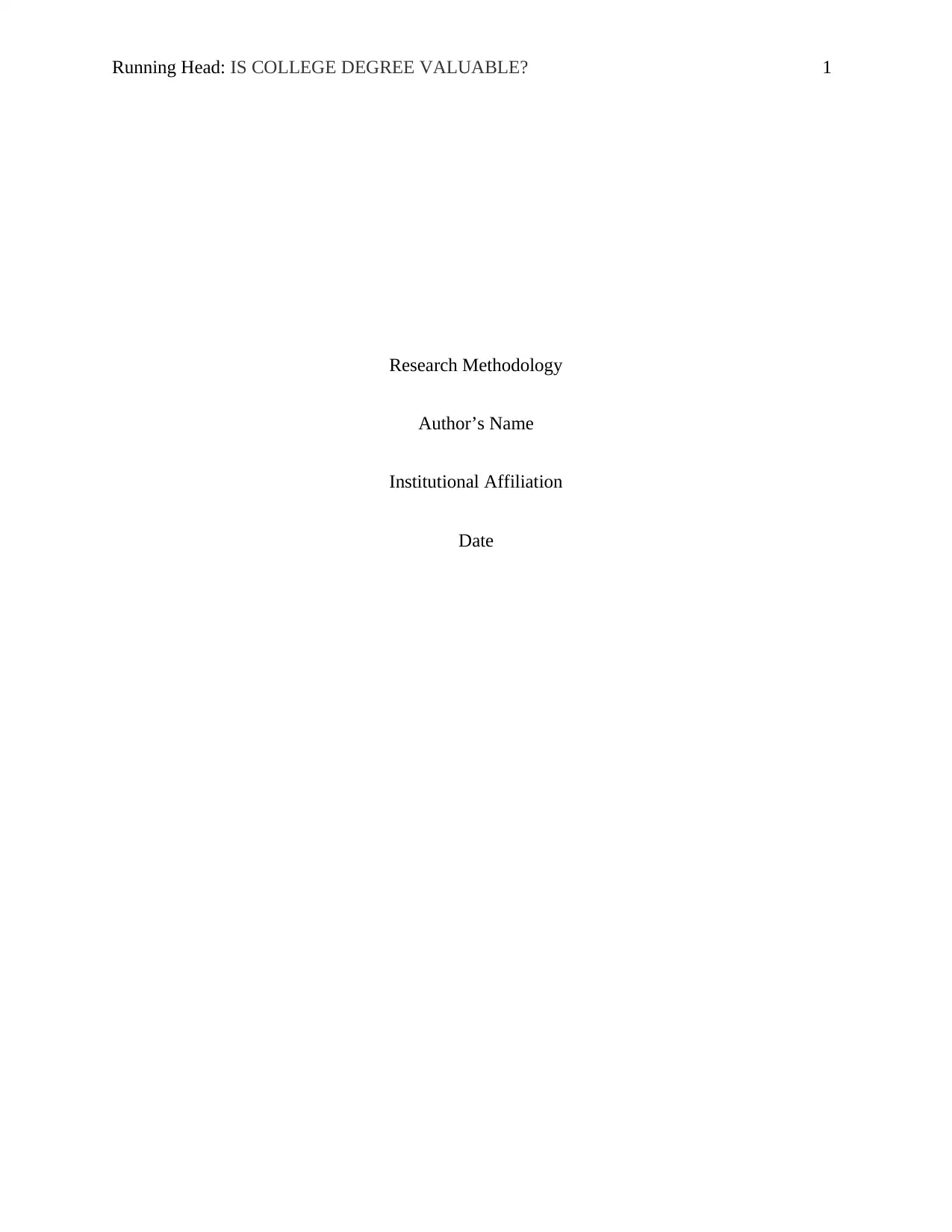
Running Head: IS COLLEGE DEGREE VALUABLE? 1
Research Methodology
Author’s Name
Institutional Affiliation
Date
Research Methodology
Author’s Name
Institutional Affiliation
Date
Paraphrase This Document
Need a fresh take? Get an instant paraphrase of this document with our AI Paraphraser
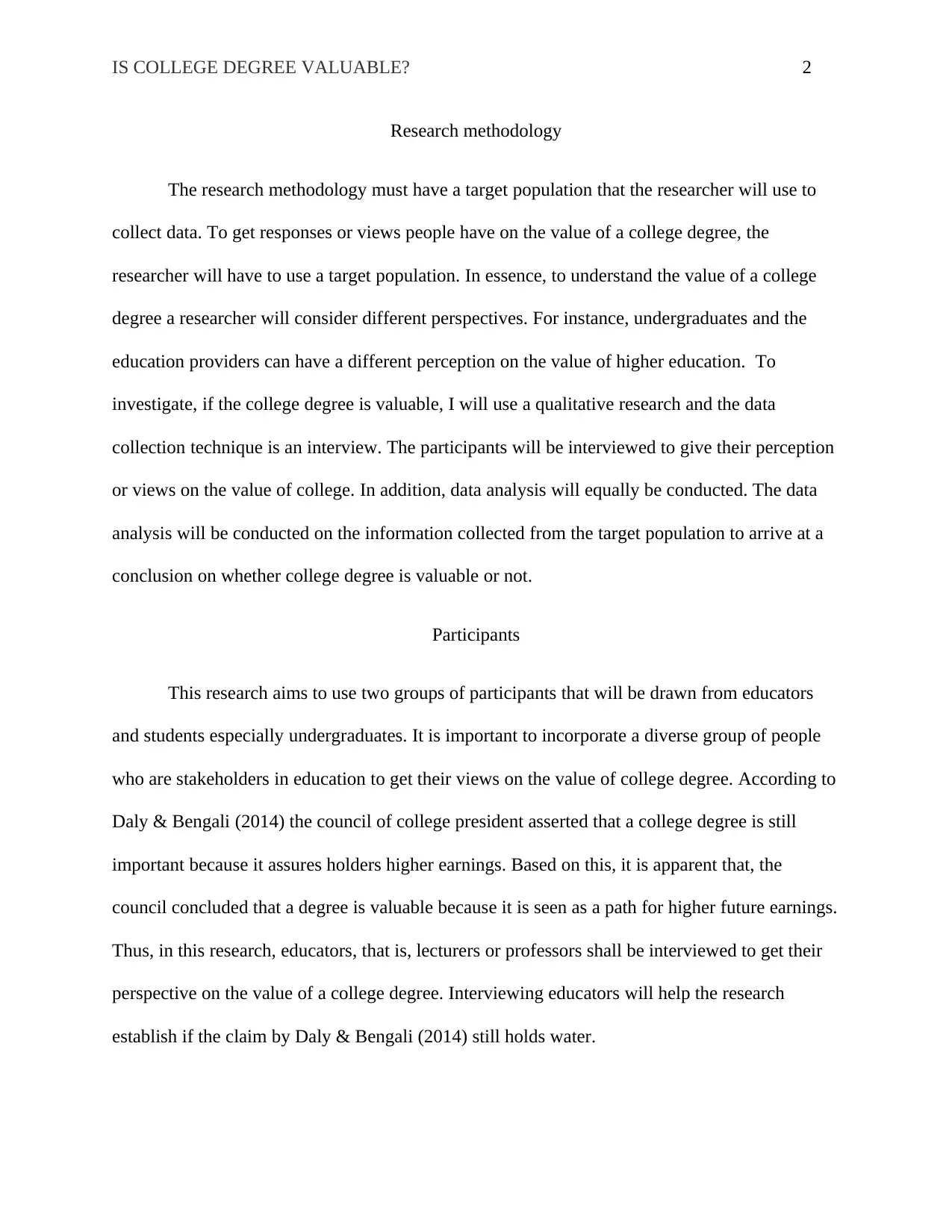
IS COLLEGE DEGREE VALUABLE? 2
Research methodology
The research methodology must have a target population that the researcher will use to
collect data. To get responses or views people have on the value of a college degree, the
researcher will have to use a target population. In essence, to understand the value of a college
degree a researcher will consider different perspectives. For instance, undergraduates and the
education providers can have a different perception on the value of higher education. To
investigate, if the college degree is valuable, I will use a qualitative research and the data
collection technique is an interview. The participants will be interviewed to give their perception
or views on the value of college. In addition, data analysis will equally be conducted. The data
analysis will be conducted on the information collected from the target population to arrive at a
conclusion on whether college degree is valuable or not.
Participants
This research aims to use two groups of participants that will be drawn from educators
and students especially undergraduates. It is important to incorporate a diverse group of people
who are stakeholders in education to get their views on the value of college degree. According to
Daly & Bengali (2014) the council of college president asserted that a college degree is still
important because it assures holders higher earnings. Based on this, it is apparent that, the
council concluded that a degree is valuable because it is seen as a path for higher future earnings.
Thus, in this research, educators, that is, lecturers or professors shall be interviewed to get their
perspective on the value of a college degree. Interviewing educators will help the research
establish if the claim by Daly & Bengali (2014) still holds water.
Research methodology
The research methodology must have a target population that the researcher will use to
collect data. To get responses or views people have on the value of a college degree, the
researcher will have to use a target population. In essence, to understand the value of a college
degree a researcher will consider different perspectives. For instance, undergraduates and the
education providers can have a different perception on the value of higher education. To
investigate, if the college degree is valuable, I will use a qualitative research and the data
collection technique is an interview. The participants will be interviewed to give their perception
or views on the value of college. In addition, data analysis will equally be conducted. The data
analysis will be conducted on the information collected from the target population to arrive at a
conclusion on whether college degree is valuable or not.
Participants
This research aims to use two groups of participants that will be drawn from educators
and students especially undergraduates. It is important to incorporate a diverse group of people
who are stakeholders in education to get their views on the value of college degree. According to
Daly & Bengali (2014) the council of college president asserted that a college degree is still
important because it assures holders higher earnings. Based on this, it is apparent that, the
council concluded that a degree is valuable because it is seen as a path for higher future earnings.
Thus, in this research, educators, that is, lecturers or professors shall be interviewed to get their
perspective on the value of a college degree. Interviewing educators will help the research
establish if the claim by Daly & Bengali (2014) still holds water.
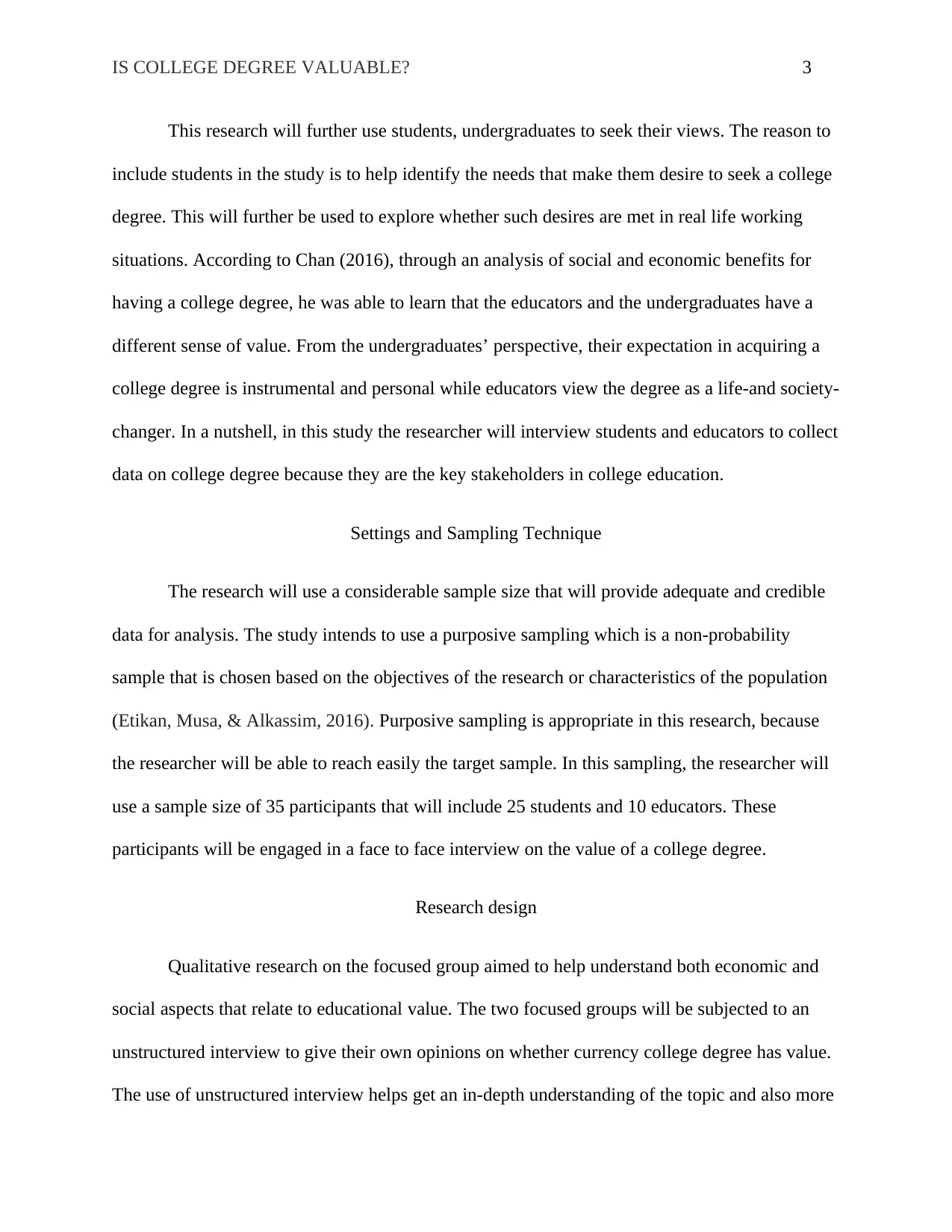
IS COLLEGE DEGREE VALUABLE? 3
This research will further use students, undergraduates to seek their views. The reason to
include students in the study is to help identify the needs that make them desire to seek a college
degree. This will further be used to explore whether such desires are met in real life working
situations. According to Chan (2016), through an analysis of social and economic benefits for
having a college degree, he was able to learn that the educators and the undergraduates have a
different sense of value. From the undergraduates’ perspective, their expectation in acquiring a
college degree is instrumental and personal while educators view the degree as a life-and society-
changer. In a nutshell, in this study the researcher will interview students and educators to collect
data on college degree because they are the key stakeholders in college education.
Settings and Sampling Technique
The research will use a considerable sample size that will provide adequate and credible
data for analysis. The study intends to use a purposive sampling which is a non-probability
sample that is chosen based on the objectives of the research or characteristics of the population
(Etikan, Musa, & Alkassim, 2016). Purposive sampling is appropriate in this research, because
the researcher will be able to reach easily the target sample. In this sampling, the researcher will
use a sample size of 35 participants that will include 25 students and 10 educators. These
participants will be engaged in a face to face interview on the value of a college degree.
Research design
Qualitative research on the focused group aimed to help understand both economic and
social aspects that relate to educational value. The two focused groups will be subjected to an
unstructured interview to give their own opinions on whether currency college degree has value.
The use of unstructured interview helps get an in-depth understanding of the topic and also more
This research will further use students, undergraduates to seek their views. The reason to
include students in the study is to help identify the needs that make them desire to seek a college
degree. This will further be used to explore whether such desires are met in real life working
situations. According to Chan (2016), through an analysis of social and economic benefits for
having a college degree, he was able to learn that the educators and the undergraduates have a
different sense of value. From the undergraduates’ perspective, their expectation in acquiring a
college degree is instrumental and personal while educators view the degree as a life-and society-
changer. In a nutshell, in this study the researcher will interview students and educators to collect
data on college degree because they are the key stakeholders in college education.
Settings and Sampling Technique
The research will use a considerable sample size that will provide adequate and credible
data for analysis. The study intends to use a purposive sampling which is a non-probability
sample that is chosen based on the objectives of the research or characteristics of the population
(Etikan, Musa, & Alkassim, 2016). Purposive sampling is appropriate in this research, because
the researcher will be able to reach easily the target sample. In this sampling, the researcher will
use a sample size of 35 participants that will include 25 students and 10 educators. These
participants will be engaged in a face to face interview on the value of a college degree.
Research design
Qualitative research on the focused group aimed to help understand both economic and
social aspects that relate to educational value. The two focused groups will be subjected to an
unstructured interview to give their own opinions on whether currency college degree has value.
The use of unstructured interview helps get an in-depth understanding of the topic and also more
⊘ This is a preview!⊘
Do you want full access?
Subscribe today to unlock all pages.

Trusted by 1+ million students worldwide
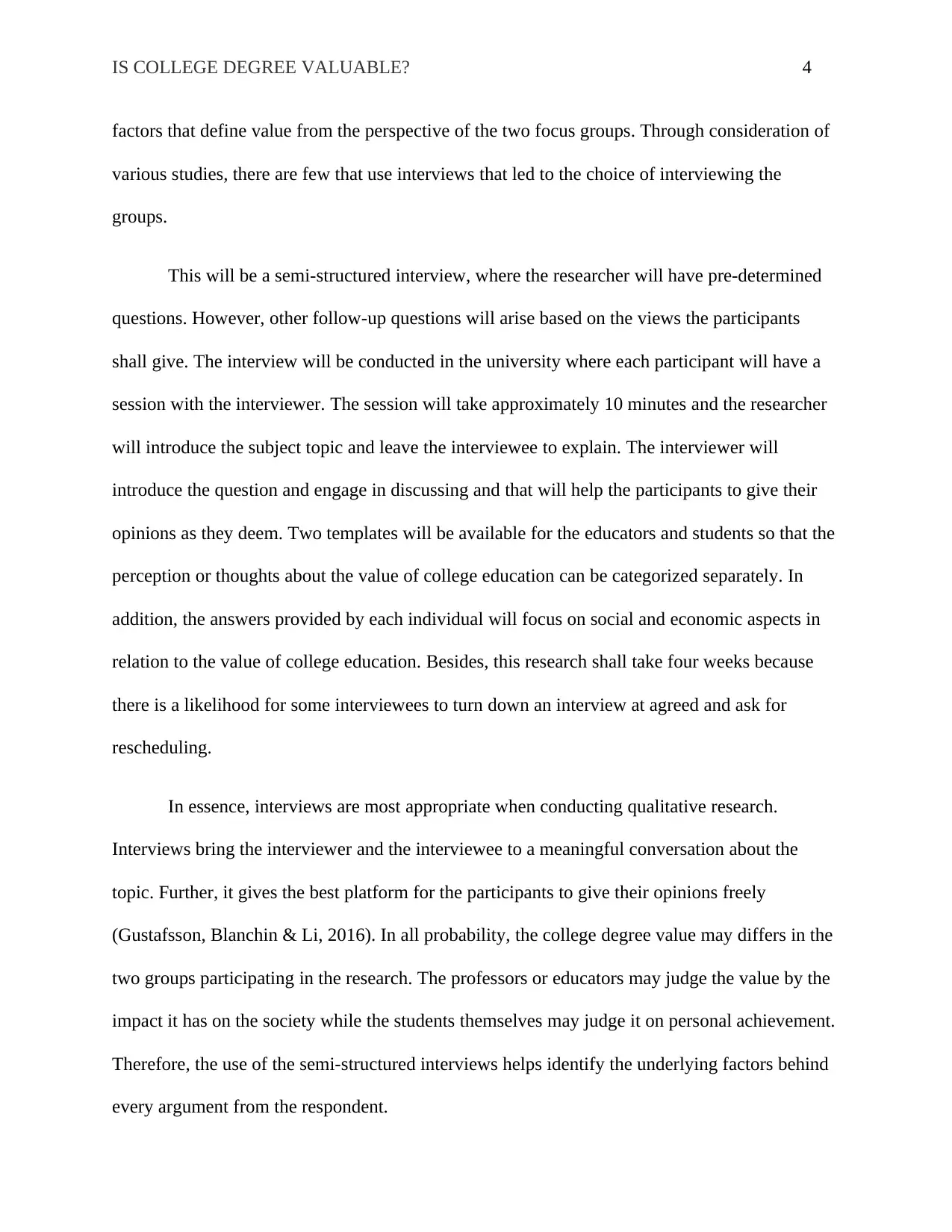
IS COLLEGE DEGREE VALUABLE? 4
factors that define value from the perspective of the two focus groups. Through consideration of
various studies, there are few that use interviews that led to the choice of interviewing the
groups.
This will be a semi-structured interview, where the researcher will have pre-determined
questions. However, other follow-up questions will arise based on the views the participants
shall give. The interview will be conducted in the university where each participant will have a
session with the interviewer. The session will take approximately 10 minutes and the researcher
will introduce the subject topic and leave the interviewee to explain. The interviewer will
introduce the question and engage in discussing and that will help the participants to give their
opinions as they deem. Two templates will be available for the educators and students so that the
perception or thoughts about the value of college education can be categorized separately. In
addition, the answers provided by each individual will focus on social and economic aspects in
relation to the value of college education. Besides, this research shall take four weeks because
there is a likelihood for some interviewees to turn down an interview at agreed and ask for
rescheduling.
In essence, interviews are most appropriate when conducting qualitative research.
Interviews bring the interviewer and the interviewee to a meaningful conversation about the
topic. Further, it gives the best platform for the participants to give their opinions freely
(Gustafsson, Blanchin & Li, 2016). In all probability, the college degree value may differs in the
two groups participating in the research. The professors or educators may judge the value by the
impact it has on the society while the students themselves may judge it on personal achievement.
Therefore, the use of the semi-structured interviews helps identify the underlying factors behind
every argument from the respondent.
factors that define value from the perspective of the two focus groups. Through consideration of
various studies, there are few that use interviews that led to the choice of interviewing the
groups.
This will be a semi-structured interview, where the researcher will have pre-determined
questions. However, other follow-up questions will arise based on the views the participants
shall give. The interview will be conducted in the university where each participant will have a
session with the interviewer. The session will take approximately 10 minutes and the researcher
will introduce the subject topic and leave the interviewee to explain. The interviewer will
introduce the question and engage in discussing and that will help the participants to give their
opinions as they deem. Two templates will be available for the educators and students so that the
perception or thoughts about the value of college education can be categorized separately. In
addition, the answers provided by each individual will focus on social and economic aspects in
relation to the value of college education. Besides, this research shall take four weeks because
there is a likelihood for some interviewees to turn down an interview at agreed and ask for
rescheduling.
In essence, interviews are most appropriate when conducting qualitative research.
Interviews bring the interviewer and the interviewee to a meaningful conversation about the
topic. Further, it gives the best platform for the participants to give their opinions freely
(Gustafsson, Blanchin & Li, 2016). In all probability, the college degree value may differs in the
two groups participating in the research. The professors or educators may judge the value by the
impact it has on the society while the students themselves may judge it on personal achievement.
Therefore, the use of the semi-structured interviews helps identify the underlying factors behind
every argument from the respondent.
Paraphrase This Document
Need a fresh take? Get an instant paraphrase of this document with our AI Paraphraser
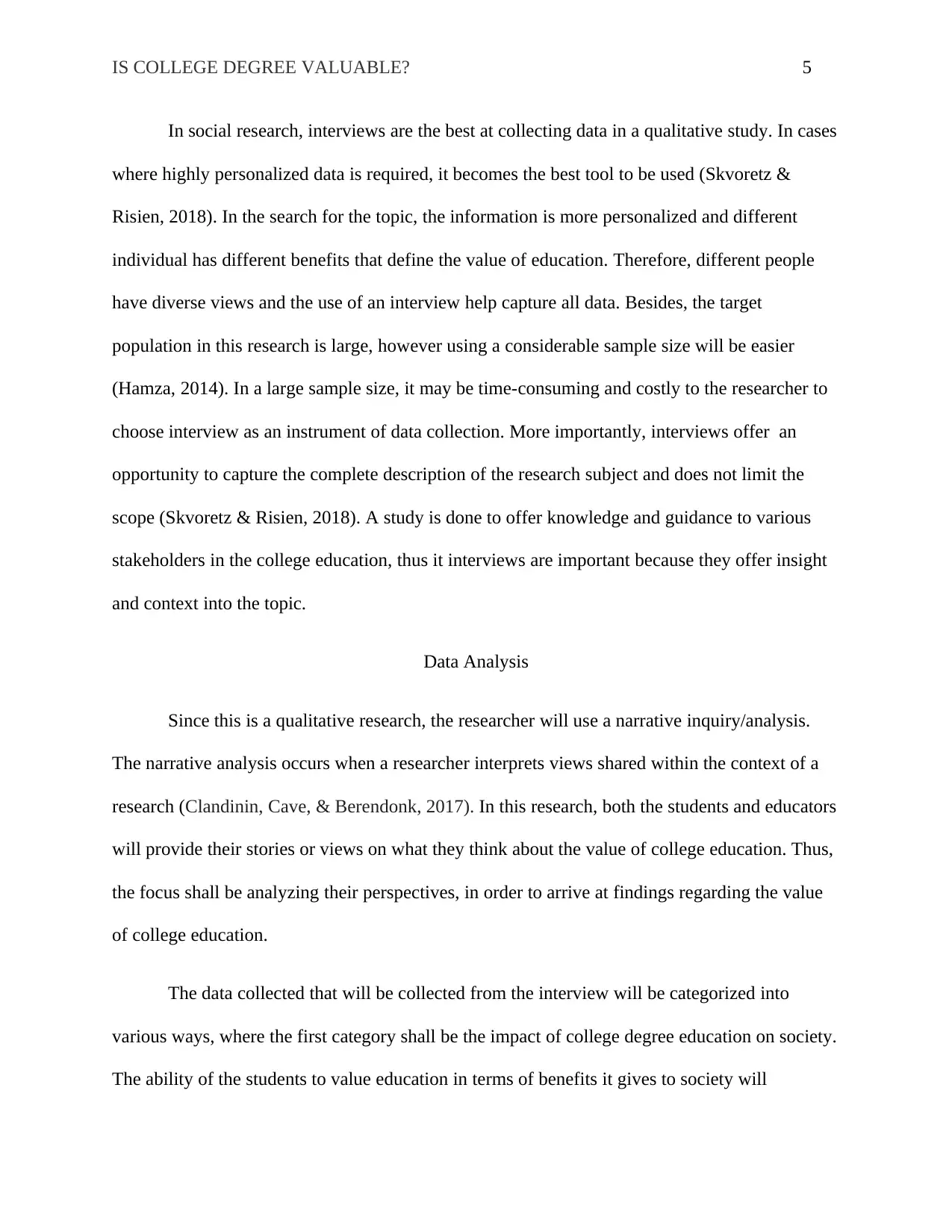
IS COLLEGE DEGREE VALUABLE? 5
In social research, interviews are the best at collecting data in a qualitative study. In cases
where highly personalized data is required, it becomes the best tool to be used (Skvoretz &
Risien, 2018). In the search for the topic, the information is more personalized and different
individual has different benefits that define the value of education. Therefore, different people
have diverse views and the use of an interview help capture all data. Besides, the target
population in this research is large, however using a considerable sample size will be easier
(Hamza, 2014). In a large sample size, it may be time-consuming and costly to the researcher to
choose interview as an instrument of data collection. More importantly, interviews offer an
opportunity to capture the complete description of the research subject and does not limit the
scope (Skvoretz & Risien, 2018). A study is done to offer knowledge and guidance to various
stakeholders in the college education, thus it interviews are important because they offer insight
and context into the topic.
Data Analysis
Since this is a qualitative research, the researcher will use a narrative inquiry/analysis.
The narrative analysis occurs when a researcher interprets views shared within the context of a
research (Clandinin, Cave, & Berendonk, 2017). In this research, both the students and educators
will provide their stories or views on what they think about the value of college education. Thus,
the focus shall be analyzing their perspectives, in order to arrive at findings regarding the value
of college education.
The data collected that will be collected from the interview will be categorized into
various ways, where the first category shall be the impact of college degree education on society.
The ability of the students to value education in terms of benefits it gives to society will
In social research, interviews are the best at collecting data in a qualitative study. In cases
where highly personalized data is required, it becomes the best tool to be used (Skvoretz &
Risien, 2018). In the search for the topic, the information is more personalized and different
individual has different benefits that define the value of education. Therefore, different people
have diverse views and the use of an interview help capture all data. Besides, the target
population in this research is large, however using a considerable sample size will be easier
(Hamza, 2014). In a large sample size, it may be time-consuming and costly to the researcher to
choose interview as an instrument of data collection. More importantly, interviews offer an
opportunity to capture the complete description of the research subject and does not limit the
scope (Skvoretz & Risien, 2018). A study is done to offer knowledge and guidance to various
stakeholders in the college education, thus it interviews are important because they offer insight
and context into the topic.
Data Analysis
Since this is a qualitative research, the researcher will use a narrative inquiry/analysis.
The narrative analysis occurs when a researcher interprets views shared within the context of a
research (Clandinin, Cave, & Berendonk, 2017). In this research, both the students and educators
will provide their stories or views on what they think about the value of college education. Thus,
the focus shall be analyzing their perspectives, in order to arrive at findings regarding the value
of college education.
The data collected that will be collected from the interview will be categorized into
various ways, where the first category shall be the impact of college degree education on society.
The ability of the students to value education in terms of benefits it gives to society will
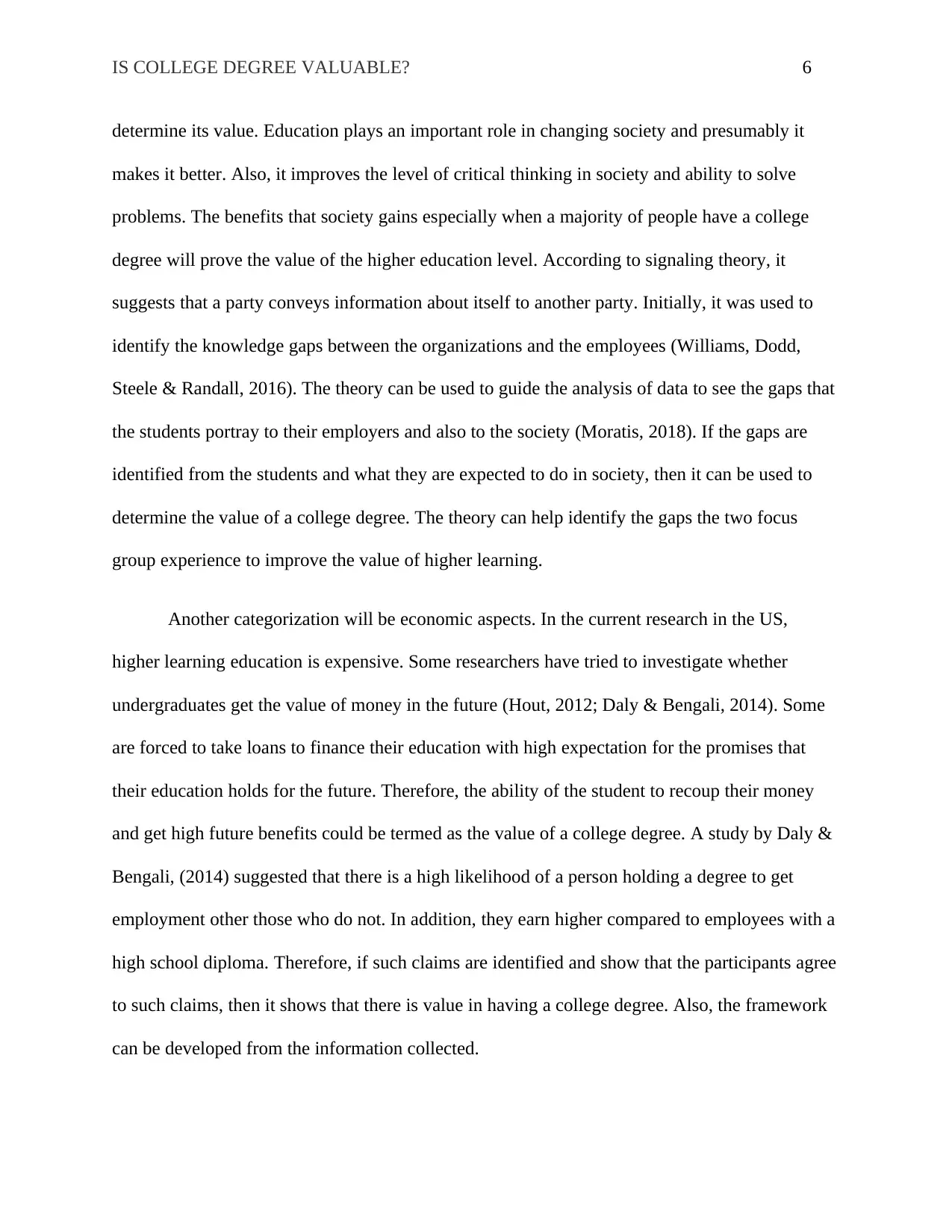
IS COLLEGE DEGREE VALUABLE? 6
determine its value. Education plays an important role in changing society and presumably it
makes it better. Also, it improves the level of critical thinking in society and ability to solve
problems. The benefits that society gains especially when a majority of people have a college
degree will prove the value of the higher education level. According to signaling theory, it
suggests that a party conveys information about itself to another party. Initially, it was used to
identify the knowledge gaps between the organizations and the employees (Williams, Dodd,
Steele & Randall, 2016). The theory can be used to guide the analysis of data to see the gaps that
the students portray to their employers and also to the society (Moratis, 2018). If the gaps are
identified from the students and what they are expected to do in society, then it can be used to
determine the value of a college degree. The theory can help identify the gaps the two focus
group experience to improve the value of higher learning.
Another categorization will be economic aspects. In the current research in the US,
higher learning education is expensive. Some researchers have tried to investigate whether
undergraduates get the value of money in the future (Hout, 2012; Daly & Bengali, 2014). Some
are forced to take loans to finance their education with high expectation for the promises that
their education holds for the future. Therefore, the ability of the student to recoup their money
and get high future benefits could be termed as the value of a college degree. A study by Daly &
Bengali, (2014) suggested that there is a high likelihood of a person holding a degree to get
employment other those who do not. In addition, they earn higher compared to employees with a
high school diploma. Therefore, if such claims are identified and show that the participants agree
to such claims, then it shows that there is value in having a college degree. Also, the framework
can be developed from the information collected.
determine its value. Education plays an important role in changing society and presumably it
makes it better. Also, it improves the level of critical thinking in society and ability to solve
problems. The benefits that society gains especially when a majority of people have a college
degree will prove the value of the higher education level. According to signaling theory, it
suggests that a party conveys information about itself to another party. Initially, it was used to
identify the knowledge gaps between the organizations and the employees (Williams, Dodd,
Steele & Randall, 2016). The theory can be used to guide the analysis of data to see the gaps that
the students portray to their employers and also to the society (Moratis, 2018). If the gaps are
identified from the students and what they are expected to do in society, then it can be used to
determine the value of a college degree. The theory can help identify the gaps the two focus
group experience to improve the value of higher learning.
Another categorization will be economic aspects. In the current research in the US,
higher learning education is expensive. Some researchers have tried to investigate whether
undergraduates get the value of money in the future (Hout, 2012; Daly & Bengali, 2014). Some
are forced to take loans to finance their education with high expectation for the promises that
their education holds for the future. Therefore, the ability of the student to recoup their money
and get high future benefits could be termed as the value of a college degree. A study by Daly &
Bengali, (2014) suggested that there is a high likelihood of a person holding a degree to get
employment other those who do not. In addition, they earn higher compared to employees with a
high school diploma. Therefore, if such claims are identified and show that the participants agree
to such claims, then it shows that there is value in having a college degree. Also, the framework
can be developed from the information collected.
⊘ This is a preview!⊘
Do you want full access?
Subscribe today to unlock all pages.

Trusted by 1+ million students worldwide
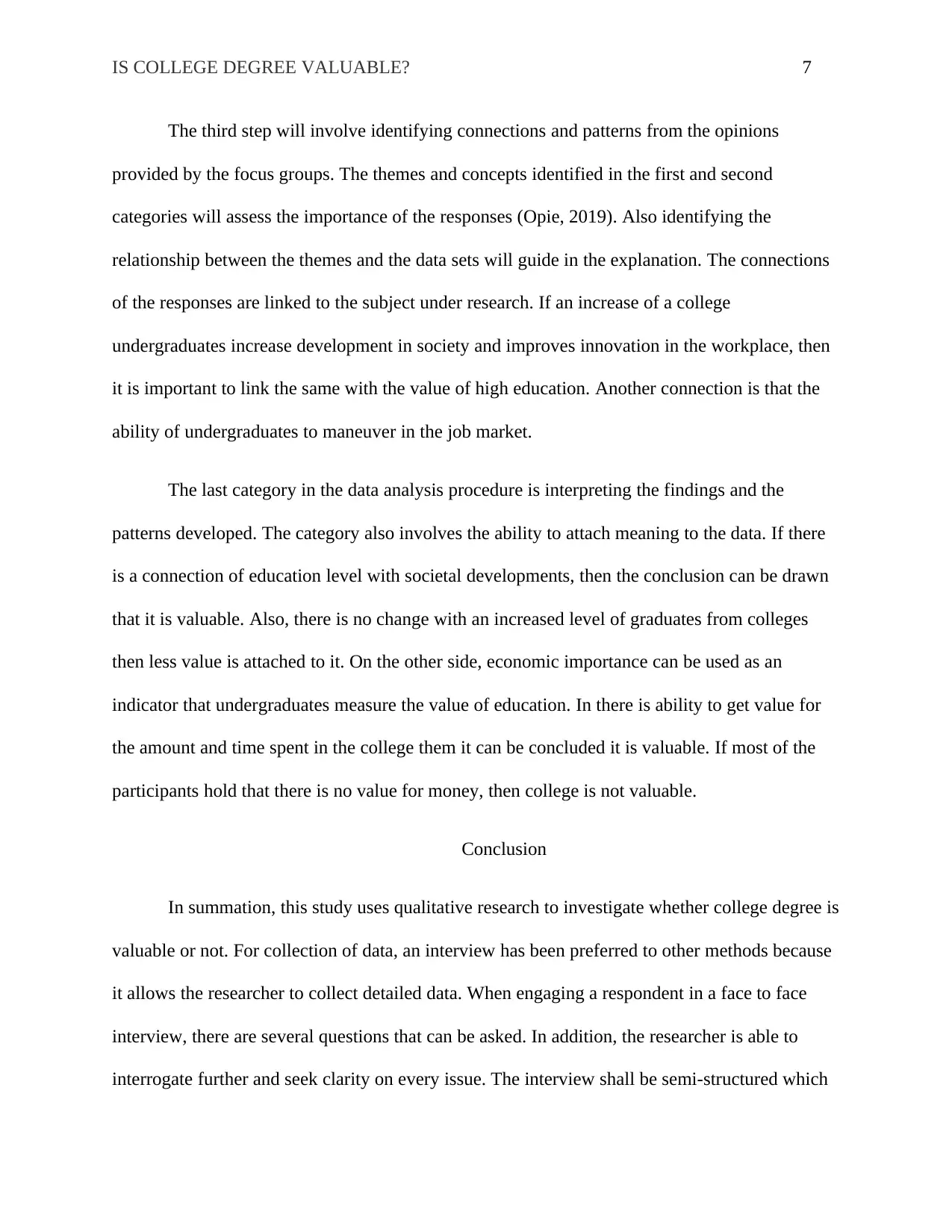
IS COLLEGE DEGREE VALUABLE? 7
The third step will involve identifying connections and patterns from the opinions
provided by the focus groups. The themes and concepts identified in the first and second
categories will assess the importance of the responses (Opie, 2019). Also identifying the
relationship between the themes and the data sets will guide in the explanation. The connections
of the responses are linked to the subject under research. If an increase of a college
undergraduates increase development in society and improves innovation in the workplace, then
it is important to link the same with the value of high education. Another connection is that the
ability of undergraduates to maneuver in the job market.
The last category in the data analysis procedure is interpreting the findings and the
patterns developed. The category also involves the ability to attach meaning to the data. If there
is a connection of education level with societal developments, then the conclusion can be drawn
that it is valuable. Also, there is no change with an increased level of graduates from colleges
then less value is attached to it. On the other side, economic importance can be used as an
indicator that undergraduates measure the value of education. In there is ability to get value for
the amount and time spent in the college them it can be concluded it is valuable. If most of the
participants hold that there is no value for money, then college is not valuable.
Conclusion
In summation, this study uses qualitative research to investigate whether college degree is
valuable or not. For collection of data, an interview has been preferred to other methods because
it allows the researcher to collect detailed data. When engaging a respondent in a face to face
interview, there are several questions that can be asked. In addition, the researcher is able to
interrogate further and seek clarity on every issue. The interview shall be semi-structured which
The third step will involve identifying connections and patterns from the opinions
provided by the focus groups. The themes and concepts identified in the first and second
categories will assess the importance of the responses (Opie, 2019). Also identifying the
relationship between the themes and the data sets will guide in the explanation. The connections
of the responses are linked to the subject under research. If an increase of a college
undergraduates increase development in society and improves innovation in the workplace, then
it is important to link the same with the value of high education. Another connection is that the
ability of undergraduates to maneuver in the job market.
The last category in the data analysis procedure is interpreting the findings and the
patterns developed. The category also involves the ability to attach meaning to the data. If there
is a connection of education level with societal developments, then the conclusion can be drawn
that it is valuable. Also, there is no change with an increased level of graduates from colleges
then less value is attached to it. On the other side, economic importance can be used as an
indicator that undergraduates measure the value of education. In there is ability to get value for
the amount and time spent in the college them it can be concluded it is valuable. If most of the
participants hold that there is no value for money, then college is not valuable.
Conclusion
In summation, this study uses qualitative research to investigate whether college degree is
valuable or not. For collection of data, an interview has been preferred to other methods because
it allows the researcher to collect detailed data. When engaging a respondent in a face to face
interview, there are several questions that can be asked. In addition, the researcher is able to
interrogate further and seek clarity on every issue. The interview shall be semi-structured which
Paraphrase This Document
Need a fresh take? Get an instant paraphrase of this document with our AI Paraphraser
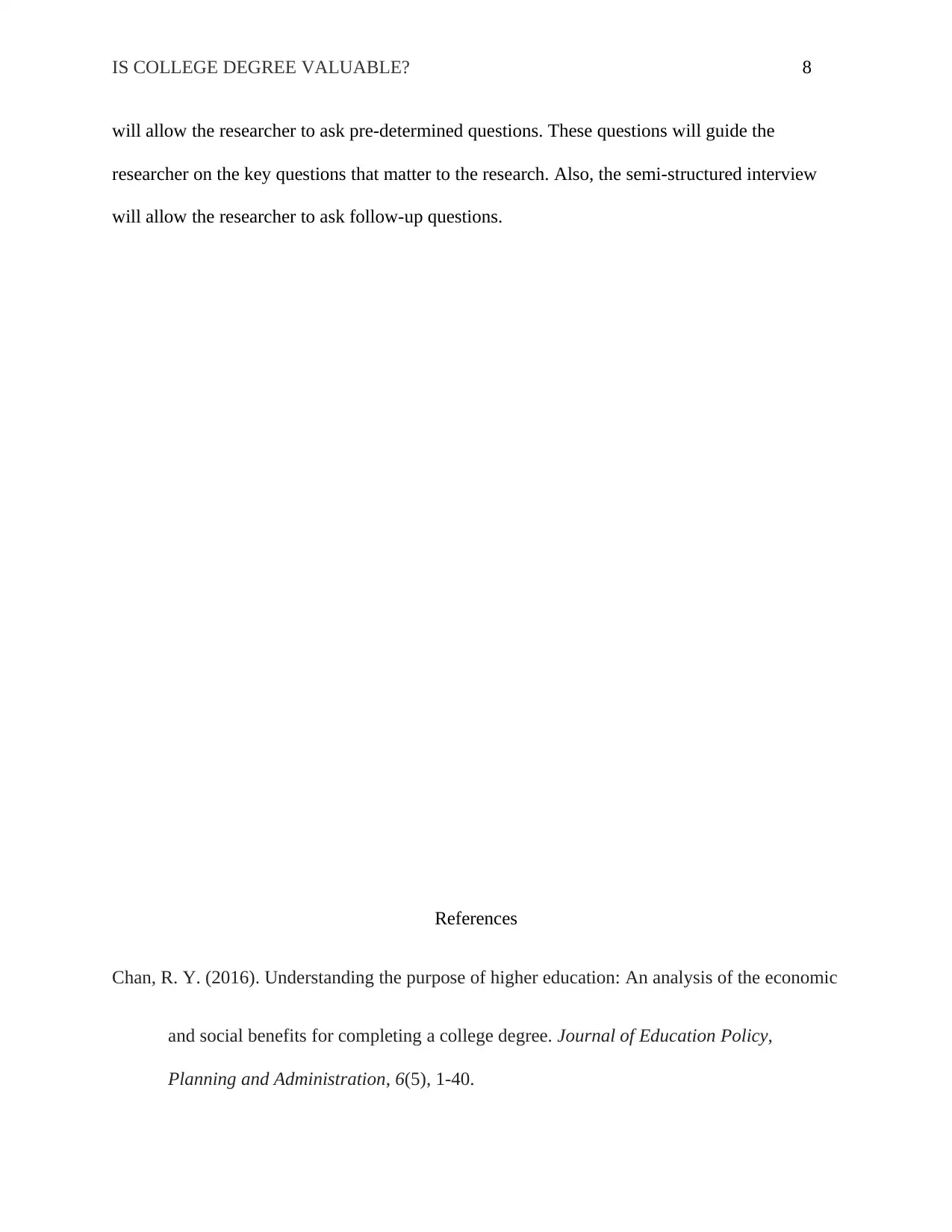
IS COLLEGE DEGREE VALUABLE? 8
will allow the researcher to ask pre-determined questions. These questions will guide the
researcher on the key questions that matter to the research. Also, the semi-structured interview
will allow the researcher to ask follow-up questions.
References
Chan, R. Y. (2016). Understanding the purpose of higher education: An analysis of the economic
and social benefits for completing a college degree. Journal of Education Policy,
Planning and Administration, 6(5), 1-40.
will allow the researcher to ask pre-determined questions. These questions will guide the
researcher on the key questions that matter to the research. Also, the semi-structured interview
will allow the researcher to ask follow-up questions.
References
Chan, R. Y. (2016). Understanding the purpose of higher education: An analysis of the economic
and social benefits for completing a college degree. Journal of Education Policy,
Planning and Administration, 6(5), 1-40.
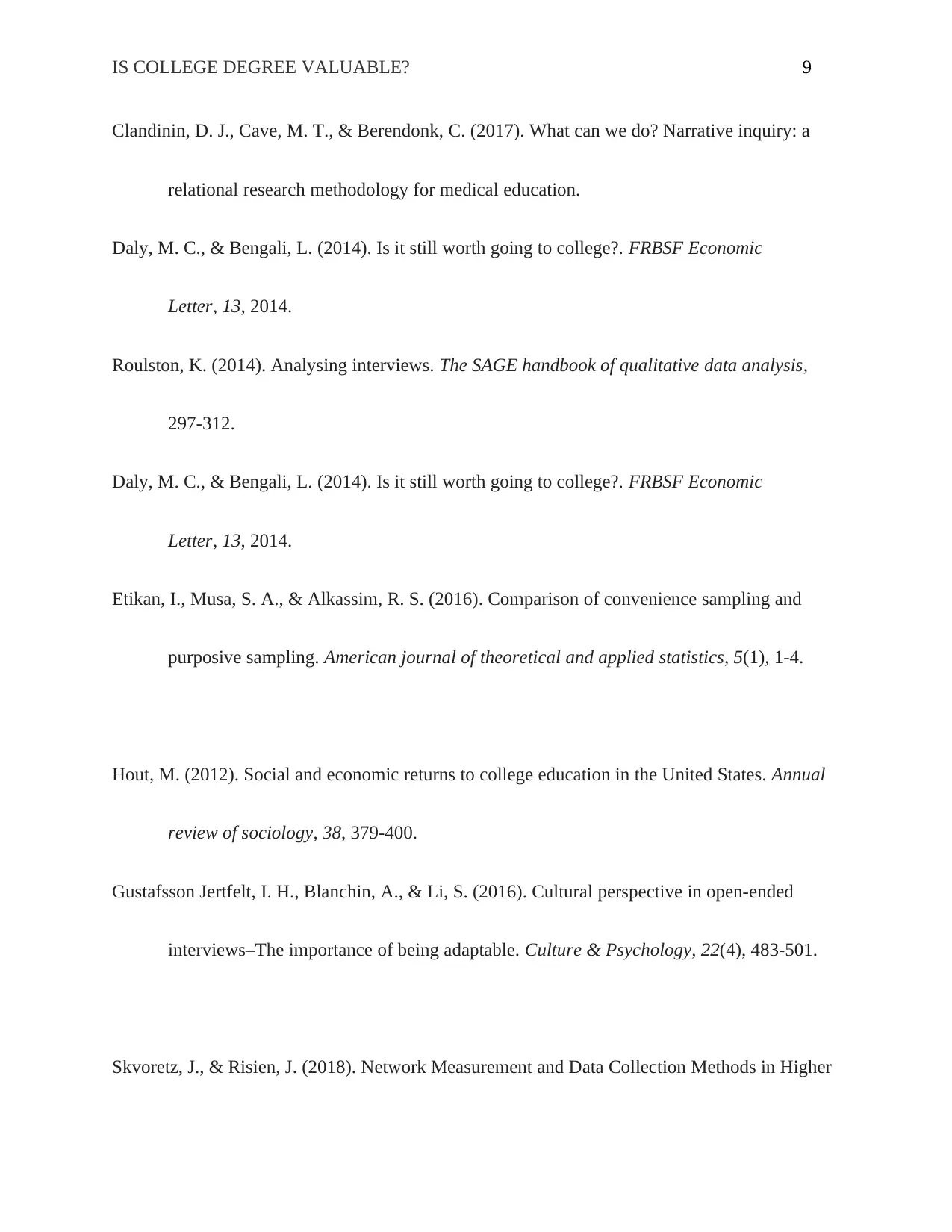
IS COLLEGE DEGREE VALUABLE? 9
Clandinin, D. J., Cave, M. T., & Berendonk, C. (2017). What can we do? Narrative inquiry: a
relational research methodology for medical education.
Daly, M. C., & Bengali, L. (2014). Is it still worth going to college?. FRBSF Economic
Letter, 13, 2014.
Roulston, K. (2014). Analysing interviews. The SAGE handbook of qualitative data analysis,
297-312.
Daly, M. C., & Bengali, L. (2014). Is it still worth going to college?. FRBSF Economic
Letter, 13, 2014.
Etikan, I., Musa, S. A., & Alkassim, R. S. (2016). Comparison of convenience sampling and
purposive sampling. American journal of theoretical and applied statistics, 5(1), 1-4.
Hout, M. (2012). Social and economic returns to college education in the United States. Annual
review of sociology, 38, 379-400.
Gustafsson Jertfelt, I. H., Blanchin, A., & Li, S. (2016). Cultural perspective in open-ended
interviews–The importance of being adaptable. Culture & Psychology, 22(4), 483-501.
Skvoretz, J., & Risien, J. (2018). Network Measurement and Data Collection Methods in Higher
Clandinin, D. J., Cave, M. T., & Berendonk, C. (2017). What can we do? Narrative inquiry: a
relational research methodology for medical education.
Daly, M. C., & Bengali, L. (2014). Is it still worth going to college?. FRBSF Economic
Letter, 13, 2014.
Roulston, K. (2014). Analysing interviews. The SAGE handbook of qualitative data analysis,
297-312.
Daly, M. C., & Bengali, L. (2014). Is it still worth going to college?. FRBSF Economic
Letter, 13, 2014.
Etikan, I., Musa, S. A., & Alkassim, R. S. (2016). Comparison of convenience sampling and
purposive sampling. American journal of theoretical and applied statistics, 5(1), 1-4.
Hout, M. (2012). Social and economic returns to college education in the United States. Annual
review of sociology, 38, 379-400.
Gustafsson Jertfelt, I. H., Blanchin, A., & Li, S. (2016). Cultural perspective in open-ended
interviews–The importance of being adaptable. Culture & Psychology, 22(4), 483-501.
Skvoretz, J., & Risien, J. (2018). Network Measurement and Data Collection Methods in Higher
⊘ This is a preview!⊘
Do you want full access?
Subscribe today to unlock all pages.

Trusted by 1+ million students worldwide
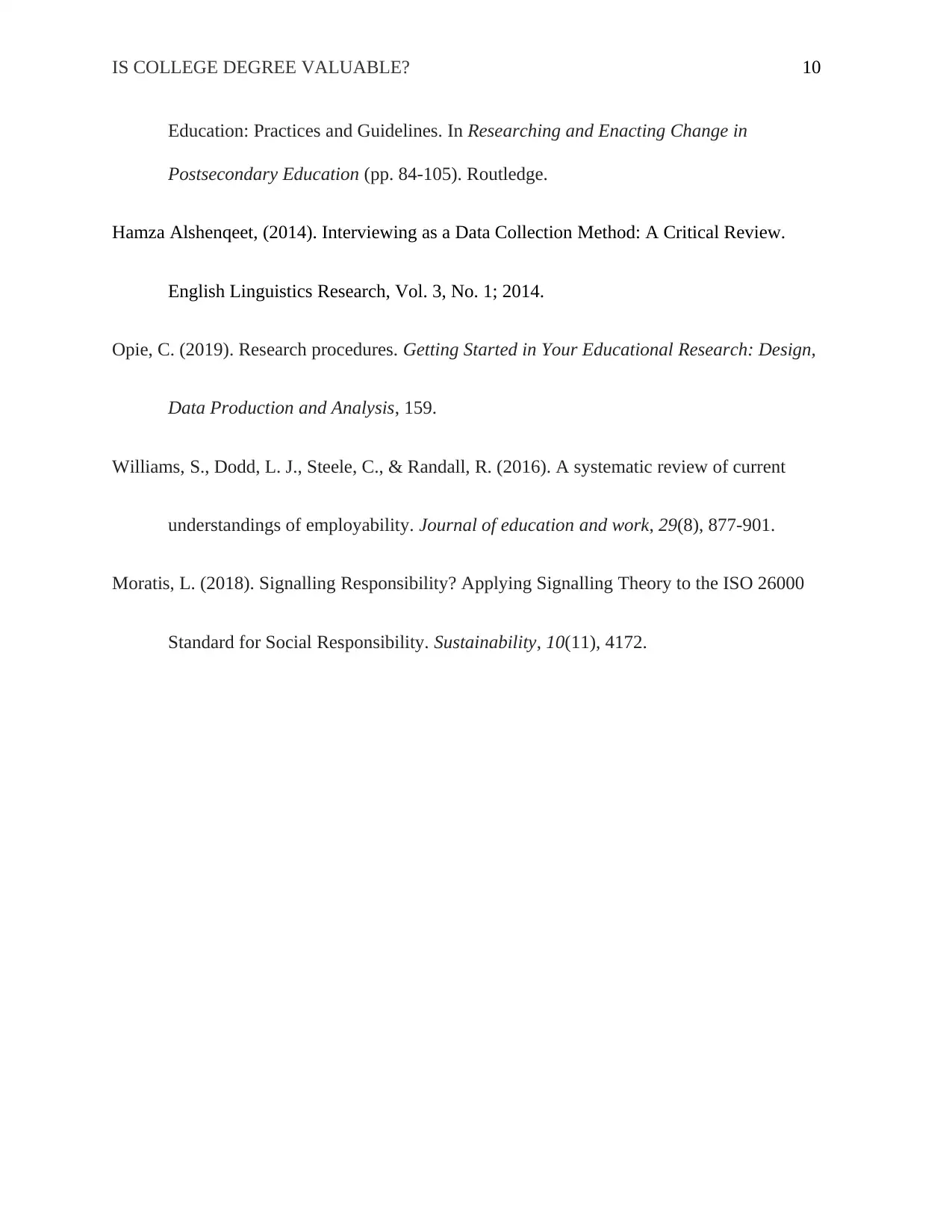
IS COLLEGE DEGREE VALUABLE? 10
Education: Practices and Guidelines. In Researching and Enacting Change in
Postsecondary Education (pp. 84-105). Routledge.
Hamza Alshenqeet, (2014). Interviewing as a Data Collection Method: A Critical Review.
English Linguistics Research, Vol. 3, No. 1; 2014.
Opie, C. (2019). Research procedures. Getting Started in Your Educational Research: Design,
Data Production and Analysis, 159.
Williams, S., Dodd, L. J., Steele, C., & Randall, R. (2016). A systematic review of current
understandings of employability. Journal of education and work, 29(8), 877-901.
Moratis, L. (2018). Signalling Responsibility? Applying Signalling Theory to the ISO 26000
Standard for Social Responsibility. Sustainability, 10(11), 4172.
Education: Practices and Guidelines. In Researching and Enacting Change in
Postsecondary Education (pp. 84-105). Routledge.
Hamza Alshenqeet, (2014). Interviewing as a Data Collection Method: A Critical Review.
English Linguistics Research, Vol. 3, No. 1; 2014.
Opie, C. (2019). Research procedures. Getting Started in Your Educational Research: Design,
Data Production and Analysis, 159.
Williams, S., Dodd, L. J., Steele, C., & Randall, R. (2016). A systematic review of current
understandings of employability. Journal of education and work, 29(8), 877-901.
Moratis, L. (2018). Signalling Responsibility? Applying Signalling Theory to the ISO 26000
Standard for Social Responsibility. Sustainability, 10(11), 4172.
1 out of 10
Related Documents
Your All-in-One AI-Powered Toolkit for Academic Success.
+13062052269
info@desklib.com
Available 24*7 on WhatsApp / Email
![[object Object]](/_next/static/media/star-bottom.7253800d.svg)
Unlock your academic potential
Copyright © 2020–2026 A2Z Services. All Rights Reserved. Developed and managed by ZUCOL.





